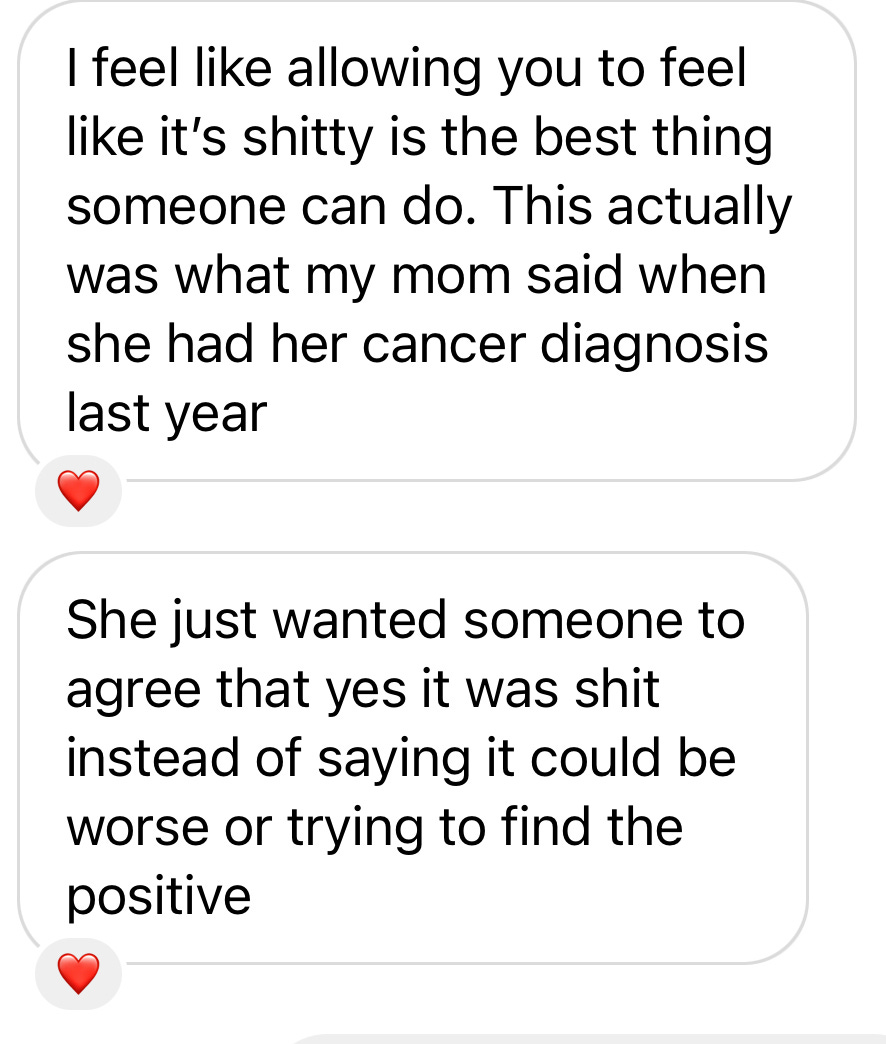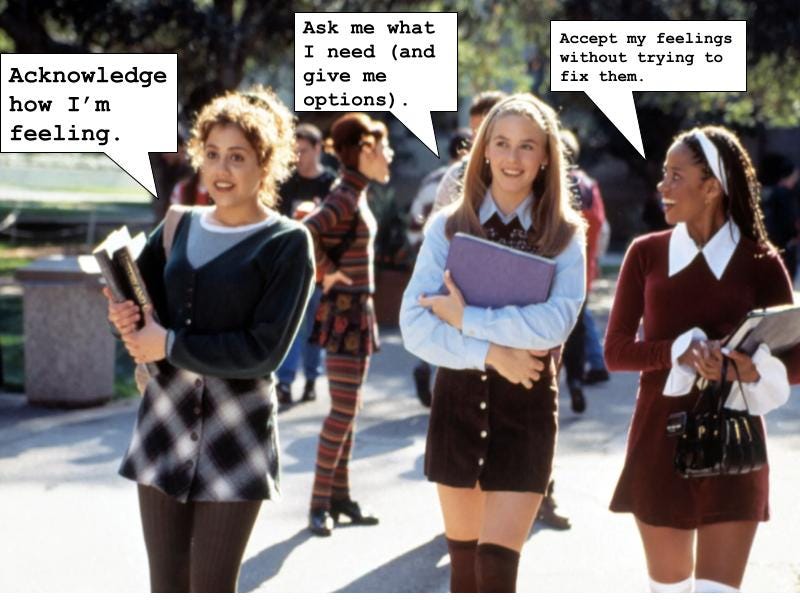The first rule of Complicated Mothers Day Club is…
We absolutely need to talk about this club.

There is an entire subculture of people for whom Mother’s Day is not just a logistical problem to solve – where to have brunch, how to get the flowers delivered in time – but an occasion for existential angst. Growing up, I did not know as much about this group as I do today, as a card-carrying member. I think of it now as the Complicated Mother’s Day Club (CMDC).
Within this group are people who:
Have mothers who are capital-C Complicated themselves— mentally ill, addicted, abusive, estranged, or otherwise inconsistent in their expressions of care
Have mother figures who are not available to them at this time — because they are a long distance away, sick or otherwise incapacitated, or deceased
Wish to be mothers, to one or more children, but whose circumstances are not cooperating with this desire – from breakups and divorce to fertility struggles and pregnancy loss
Are parenting under impossible conditions – lacking adequate childcare or spousal support, dealing with chronic illnesses, raising children with needs that are unsupported by our society, and more
People facing some very difficult combination of the above
For these people, Mother’s Day is a reminder of all that they do not have.
If this describes you, or someone you love – you can come sit next to us. This post is for you.
Last week, my friend Ashley and I discussed this club vis a vis her own hard initiations into motherhood, which included pregnancy loss. This line of hers stuck with me:
“Most of the time people didn't know what to say to us after our loss, so they didn't say anything. That is not the right thing to do, by the way.”
We agreed that the #1 rule of this club is the opposite of the #1 rule of Fight Club: we absolutely need to talk about it. We don’t want people to keep not saying anything to us about our medium-to-large Mother Wounds. And yet, I understand that it’s hard sometimes to know what the right thing is to do or say.
So, I put out a call to other friends in the club for additional tips, for Complicated Mother’s Day and beyond. I spoke with journalists, novelists, marketing and PR pros, chaplains, and early childhood educators — people who already live comfortably at the intersection of “good with words” and “good with feelings.” Despite their diverse backgrounds, these were the common themes:
When Mother’s Day is Complicated:
#1 Acknowledge what’s hard about this for us.
#2 Ask us how you can help, by empowering us through choice.
#3 Accept what is currently true for us, according to us.
Below, I break this down more explicitly, because I’ve received the feedback that this is helpful to people who want to better give or receive care. I also invite you to add your own ideas (or favorite lines from 80s/90s feminist flicks), if you too are a member of the CMDC.
#1 Acknowledge what’s hard about this day for us.
Words to use:
“Hey, I know Mother’s Day is coming up, and I know _______. I can imagine this might make this a more complicated day to mark.”
What could go in the “_____”? Stick to the concrete details you’re sure about vs. assuming. I.e.:
You imagined spending this day differently.
You are having to navigate this day without _____ (say their name, if you know it).
Things have been hard between you and X.
I know you’ve mentioned that you need a minute.
Avoid:
I know you’ll be a mom someday! Just relax! It worked for my cousin! (Serious health conditions may be at play. Their level of chill/your cousin’s mileage here is irrelevant.)
You are grieving your angel baby. (No two birthing people will make the same meaning out of their losses; not all use terms like “angel” or even “baby.”)
Related: You are probably missing _____ so much. (This may not apply.)
You GoT tHiS, bOo! (No, they don’t.)
#2 Ask us how you can help, by empowering us through choice.
Words to use:
“I’d love to show you some extra love on this day. I can ______ or _______. Let me know if there’s one you’d prefer. And if you can’t decide, can’t respond, or don’t want to receive these things right now, this offer does not expire. I’m here for you all year.”
What could go in this “_____”? In this post, I detailed the things I loved receiving last year after our loss – vegan donuts, warm soup – but your loved one may prefer:
Acts of service: Fold laundry, cook dinner, watch their kids/baby monitor
Words of praise: write them a letter; pay for a therapy session
Loving presence: offer to go for a bike ride, take in a movie, throw axes or break things with them
Gifts: something time-saving or indulgent. (Avoid products containing THC/CBD, lemongrass and ashwagandha if they’re trying to conceive, pregnant or breastfeeding, unless they tell you otherwise.)
Physical contact: help them access the safe touch of their choice via a local spa or wellness space
Avoid:
“Let me know if you need anything.” (No shade if you let this fly in a panicked moment, but try to circle back with some concrete ideas later on.)
Anything that smells like "you should…" vs. "I could…” or like an offer they can’t refuse. (Being trauma-informed always involves empowering someone with choices that feel right for them, especially in situations around which they would otherwise feel powerless.)
Important: be prepared for a wide range of responses.
I just feel so alone.
I'm fine! Staying busy! How are you?!
I'm full of rage! How are you?!
None of that works for me. Thanks anyway.
[Silence.]
Witnessing my loved ones’ misery or avoidance can trigger my own eldest-daughter impulse to tour the facility and pick up slack instead of just listening. (The Anxious Overachiever has great resources on this.) But the goal here on Complicated Mother’s Day isn’t to fix anything — it is simply to provide your loved one with an experience of imperfect but unconditional acceptance. You know, the thing they're likely most missing today.
#3 Accept what is currently true for us, according to us.
Words to use:
I hear you. (Or, if you both watch The Bear: “Heard, chef.”)
That sounds so hard. I'm here for you.
Just here to remind you that you are lovable and loved no matter what.
Avoid:
“At least…” (Always a no-no.)
“Have you tried…?” (Probably they have, yes.)
I'm sure _____ is doing/did her best." (Defining a loved one’s"best,” and whether they are doing/did it, is a lifelong struggle for some. Not a brunch topic.)
"I can't imagine." (People marking a Complicated Mothers Day are grieving, among many things, this level of innocence. If you still have it, don’t rub it in.)
A word of caution on "That's valid”:
This can sound soothing when said in a peer-to-peer context. I said this myself last week, in the context of my friend Ashley losing her capital-P Person, an experience I too have had:
Ashley: Everything was happening so fast. The world kept spinning as if nothing had happened, but my whole world had changed.
Ryan: That’s a common, valid feeling.
Who should not say this? Someone who holds more privilege than you do.
Why? There is a dangerous and well-documented empathy gap in America that all too often results in men deciding that the pain of women is not valid, and white people deciding the pain of POC is not valid. This gap is a major factor in everything that makes birthing and mothering in this country very difficult. Setting yourself up as the Decider of Validity, in this context, is not a good look.
Better to say something like this: "Thank you for trusting me with this. I'm here."
Once you’ve made a plan with this person to support them, a few final things to avoid:
Poor follow-through. (Leaving them on “read,” not coming through on your offers, not bringing up their hard things when you’re finally in the same room, or or making it so difficult to receive your acts of service that they may as well not bother.)
Pestering them for feedback, or making them feel like they owe or need to effusively thank you. (“I saw FedEx delivered it yesterday! I hope it’s OK!!1!!!” Many people turn their phones entirely off on Complicated Mother’s Day. Give them a minute.)
To recap:
Repeat as needed, on your next Complicated Mother’s Day.
CHOICES FOR YOU THIS WEEK:
If you had a mothers who is/was absent or harmful in some way:
has a class for that. Writing the Mother Wound is coming up on June 3. More info here.If you have a mother who is requiring care themselves: Writing coach Laura Davis is offering a half-day writing workshop on being a caregiver on Tuesday, June 27. Register here.
If you are mourning the death of a biological or chosen mother: my interview with reporter Ashley Locke may help you feel less alone.
If you are moving through infertility or pregnancy loss this year: You may find help with in the course offerings at RTZ Hope, where I sometimes teach. If cost is a barrier, PSI offers free drop-in groups
If you are parenting or marking this day under any other impossible circumstances: consider asking a friend to help you fill out this survey from Anne Helen Petersen’s
, so that people have a concrete sense of what you need.If you live in the tri-state area: my friend Anna is co-hosting Mom Rager at Ossining’s Bethany Arts Center on Friday 5/12. Here’s how she describes it: “There will be a punching bag. People are saving up ceramic plates because there will be a smashing station. There will be massages. There will be a dance party. I don’t know if Le Tigre will be on the playlist, but it should be.”
Allies who want to help us: Thank you for reading this far, and being the kind of people willing to walk us through hard things. Please know that when you are facing your own unimaginable moment in the future, you can find no more loyal friends than the Complicated Mothers Day Club–-because the people that have Been There know best how to help you through it.
What other advice would you add? Let us know in the comments. And if no one else tells you this today: you go, Glenn Coco.







Very sound advice. I think I’m in the club, ticking a few boxes 💛✨
Oof, this resonates.
After 17 Mother's Days without my mother (who died in a car accident when I was 19), I have a lot of pain associated with this topic. It has gotten easier as the years have passed and I've moved further away from the initial site of trauma, but there's always a twinge of agony.
Sending love to all the Mother-less among us. Thank you for this invaluble resource Ryan.